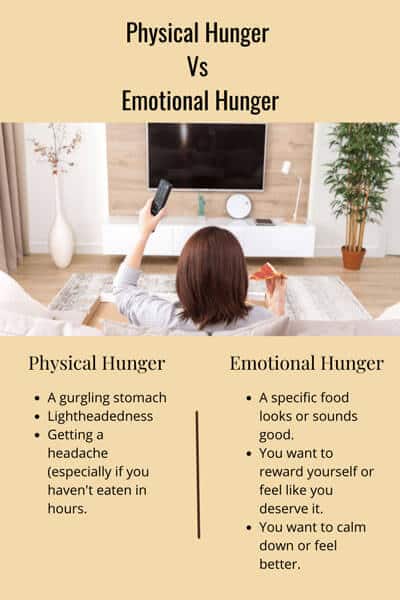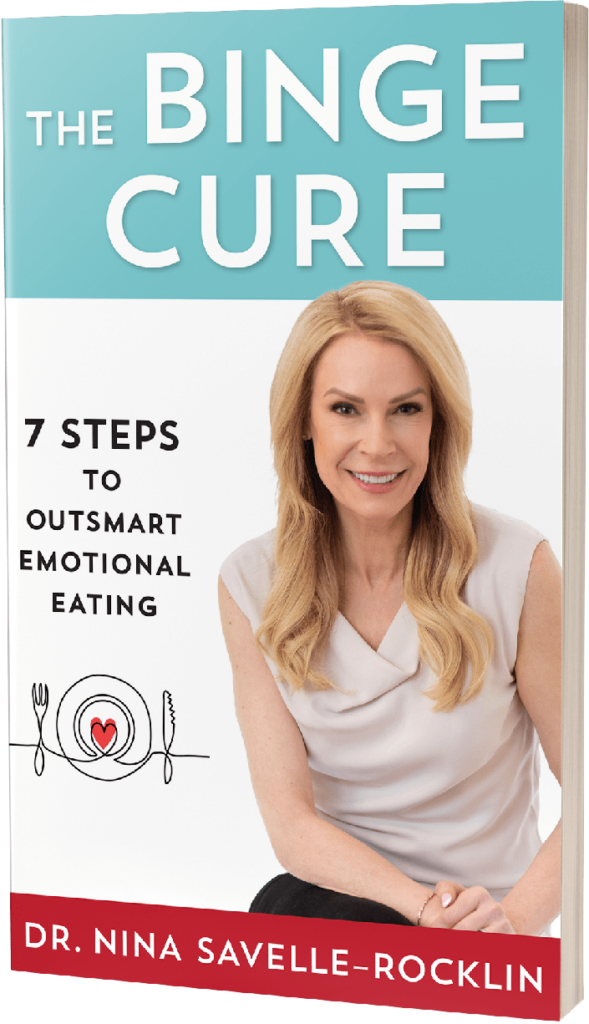Dr. Nina Savelle-Rocklin
5 Crucial Steps On How to Stop Binge Eating at Night
Table of Contents
- Why do you binge eat at night?
- Step 1: Identify what is the difference between emotional hunger and physical hunger
- Step 2: Be your own best friend. Listen to your body
- Step 3: Look at what binge eating might be doing FOR you
- It’s not because you are addicted to food
- Take my client Annette for example…
- Step 4: Look for clues in the types of foods that you are choosing.
- Step 5: Find ways to express your emotions instead of stuffing them down with food
- Treatment for Binge Eating
- To wrap it all up, here’s how to stop binge eating at night
- Frequently Asked Questions:
Ever found yourself raiding the fridge at midnight, even though you’re not physically hungry? Nighttime binge eating is a common struggle that goes beyond just food. It’s often about managing emotions, stress, or avoiding uncomfortable thoughts.
This impacts more than your waistline – it affects your emotional well-being, creating guilt, shame, and self-loathing. But, nighttime binge eating isn’t about lack of willpower.
It’s rooted in deeper psychological factors. Maybe food serves as a distraction from anxiety, or perhaps it’s a misguided attempt at self-soothing.
The key is figuring out what you’re really hungry for. Is it comfort? Escape from stress? A way to process emotions you’ve been avoiding all day?
By understanding these underlying triggers, you can start to shift this behavior. It’s not about controlling food – it’s about addressing what’s really eating “at” you. Remember, is possible is possible. It starts with curiosity about your inner world, not judgment about what’s on your plate.
Why do you binge eat at night?
Bingeing is a way of coping with something inside. It’s about using food for comfort, distraction or to numb ourselves and express feelings of pain, anger, anxiety, or anything uncomfortable.

Step 1: Identify what is the difference between emotional hunger and physical hunger
If you want to learn how to stop binge eating at night, you will need to do some detective work. We’re going to start by looking at the difference between emotional hunger and physical hunger.
There is a difference between emotional hunger and physical hunger. You might actually be eating food because you are hungry, but it could be because you are dealing with emotional hunger instead.
Physical hunger looks like…
- A gurgling stomach.
- Lightheadedness.
- Getting a headache (especially if you haven’t eaten in hours).
Emotional hunger looks like…
- A specific food looks good or sounds good.
- You want to reward yourself or you feel like you deserve it.
- You want to calm down or feel better.
Stop and ask yourself, what type of hunger am I experiencing right now? Be honest with yourself. Which symptoms am I having right now?
Lots of people eat to feel energized. This isn’t emotional hunger, but it’s the wrong type of response to exhaustion. If you are tired, you need rest, not food.
Also, if you are choosing energy food, you want to choose lean proteins, vegetables, and fruit, not sugary sweets that will give you a quick burst of energy now but leave you feeling even more tired later.
Try this exercise:
Next time you feel “hungry,” try postponing your meal for three minutes and see what happens. If you are physically hungry, you will probably get hungrier. If you are emotionally hungry, you may become more aware of the emotional triggers that are the driving force behind your urge to eat.
When you know if you’re eating because you are hungry for food or to resolve an internal conflict, it becomes easier to make healthy food choices.

Step 2: Be your own best friend. Listen to your body
Be kind to yourself and listen to your body. What does it need right now? Is it sleep, is it food because you really are hungry, or is it something else?
How can you be nicer to yourself and look for opportunities to improve the way that you talk to yourself?
Oftentimes, the way you speak to yourself could be doing more harm than good, especially if you are alone at night. Asking your body what it needs can go a long way to helping you be more mindful when you are eating.
Step 3: Look at what binge eating might be doing FOR you
Now that you’ve identified that it’s not really physical hunger that you are experiencing, it’s time to put on your detective hat and start looking for clues. Emotional eating is often triggered by subconscious thoughts or emotions. So let’s play detective.
Ask yourself…
- What happened before I started binge eating at night the last time?
- What was I thinking about?
- How was I feeling?
- What was I saying to myself?
- Was I eating to avoid thoughts, feelings, etc?
- Is there a pattern of things or are they different things that are occurring? Do I see a common theme here?
This is where keeping a journal can be so helpful. Take time to ask yourself these questions and see what comes up for you right then? You might find patterns in the things that are causing you to turn to food.
Our minds are incredibly adept at protecting us from unpleasant or upsetting emotions. We often become so good at avoiding what’s bothering us that we don’t even know why we are triggered. If you’re turning to food and you don’t understand why.
I’m here to tell you it’s not because you’re addicted to food or have no willpower. It’s because your mind has found a way to protect you from something else.

It’s not because you are addicted to food
Many people think their issue with binging at night is because they are addicted to food and out of willpower. They think they’ve become addicted to sugar, carbs, pizza, or Doritos.
The truth is this “addiction” is really your mind’s way of coping with something else. If you deal with the trigger, this addition usually goes away on its own because you never were really addicted to the thing in the first place.
Take my client Annette for example…
My client Annette was CONVINCED that she was addicted to sugar. She liked to bake cookies with her kids and would look for excuses to get them out of the kitchen so she could eat the cookie batter or the baked cookies.
When we dug into it, we discovered that she was really using food to substitute for fun. She was going through a messy divorce, had an unsatisfying job, and had no source of enjoyment in her life. Once she realized this, she took action. She got a job that fulfilled her and took up hobbies. Baking cookies with her kids became a fun activity to do together, and she was eventually able to eat just one cookie without feeling deprived.
Step 4: Look for clues in the types of foods that you are choosing.
Take a moment to think about your last craving. Did you want something creamy like ice cream, something filling like cake or pizza, or something crunchy like chips? What could that possibly mean? Well, in all of my years of helping people with eating issues, I’ve discovered that nearly all cravings fall into one of three categories.
Smooth, creamy foods such as ice cream or pudding.
Filling foods such as bread, pasta, pizza, cake, or muffins
Crunchy foods such as chips or crackers.
I discovered that these cravings often revealed clues about what my clients were actually craving when they turned to food.
If they wanted something creamy like ice cream, they were usually really looking for comfort, or they were feeling stressed. And, if this is you, the key to change is to figure out what has you looking for comfort and work to resolve that.
If they wanted something filling such as bread or pasta, they were really trying to make up for loneliness, boredom, or feeling deprived. If this is you, then you need to look for new ways to fill the emptiness.
Maybe it is taking up a new hobby, calling friends on the phone, joining a Facebook group, or taking a class in something like painting or yoga. Reach out to other people, chances are, they are feeling lonely too. Connection is something that we need as humans.
If my clients were craving chips or crackers, they were often angry, frustrated, or annoyed. If you are craving these types of foods, ask yourself what in your life is making you angry, frustrated, or irritated.
Here’s 5 painful mistakes that you ought to know about binge eating at night:
Step 5: Find ways to express your emotions instead of stuffing them down with food
Find ways to express your emotions that aren’t dependent on other people. This is where journaling is so helpful. You could write a letter to the person that you are angry at.
One of my favorite techniques is to write down all the things that are upsetting, frustrating, and angering me and then tear the paper into lots of tiny little pieces. It’s so satisfying! You could also tell a good friend about your feelings. (Choose wisely here.)
Treatment for Binge Eating
The most effective treatment for binge eating addresses the root causes of the behavior rather than just the symptoms.
Unlike traditional methods that focus solely on food and weight, it’s important to look into the emotional and psychological factors driving binge eating.
Once you understand that binge eating is a coping mechanism for deeper issues such as stress, anxiety, or unresolved trauma and process these underlying triggers, you can develop healthier coping strategies and a more balanced relationship with food.
The best treatment for binge eating also emphasizes self-compassion and breaking the cycle of shame and guilt often associated with binge eating.
This combination of psychoanalytic techniques and cognitive behavioral strategies empowers you to not only overcome binge eating but also to achieve lasting emotional wellness and freedom from binge eating.
For those seeking a comprehensive approach to overcoming binge eating, Dr. Nina Savelle-Rocklin’s book “The Binge Cure: 7 Steps to Outsmart Emotional Eating” offers valuable insights.
This self-help guide provides a 7-step program designed to help readers develop a healthier relationship with food by addressing the underlying emotional and psychological factors that contribute to binge eating

To wrap it all up, here’s how to stop binge eating at night
If you want to stop binge eating at night (or any time), you need to do a little detective work to figure out what has you turning to food. Are you actually physically hungry or is it emotional hunger?
What types of foods are you craving, and what is going on in your life when those cravings hit? These cravings are clues—like pieces of a puzzle—leading you to discover what’s really triggering the urge to eat.
+++By getting curious about your emotional state and what’s happening in the moment, you can start to unravel the connection between your emotions and your eating habits.
Once you start identifying these triggers, you’ll be able to take steps to meet your emotional needs directly, instead of turning to food for comfort.
Remember, the key isn’t about controlling what you eat—it’s about understanding why you’re eating. When you gain insight into that “why,” you’ll find that food loses its power, and you’ll be able to make peace with it, even at night.
The more compassionate you are with yourself through this process, the more empowered you’ll feel to make lasting changes. You can stop binge eating at night, and it begins with understanding your relationship with food on a deeper level.
Frequently Asked Questions:
Welcome to our FAQ section on managing nighttime eating habits. If you’re struggling with binge eating at night, you’re not alone. Many people face challenges when it comes to controlling late-night cravings, and finding effective strategies can make a significant difference.
In this section, we’ll address common questions and provide practical tips on how to stop binge eating at night, helping you regain control and achieve a healthier relationship with food.
Why do people binge eat at night?
People often turn to binge eating at night as a way of coping with something inside. That could mean using food for comfort, distraction, or to numb feelings of pain, anger, anxiety, or anything uncomfortable.
How can I tell the difference between emotional hunger and physical hunger?
The best way to differentiate between emotional hunger and physical hunger is to pay attention to your symptoms. Physical hunger symptoms include a gurgling stomach, lightheadedness, or getting a headache. Emotional hunger symptoms include thinking that a specific food looking or sounding good, wanting to reward yourself, or wanting to calm down or feel better.
What can I do to stop binge eating at night?
To stop binge eating at night, it's crucial to understand the underlying causes of your behavior. Distinguishing between emotional hunger and physical hunger is a good starting point. Remember to be gentle with yourself and listen to what your body is truly asking for. Focusing on the reasons behind your eating habits, rather than solely on what you eat, is also key. Keeping a journal to note your thoughts and feelings can be very revealing and helpful.
As someone who has deeply explored these challenges, I've written a book titled ‘The Binge Cure: 7 Steps to Outsmart Emotional Eating.‘ This self-help guide is designed to help you overcome emotional and binge eating disorders. It provides a 7-step program that addresses these issues and helps you develop a healthier relationship with food. For more information and to get a copy, visit The Binge Cure.
Is binge eating at night due to a food addiction?
Binge eating at night is not due to food addiction. It is often triggered by thoughts or emotions that are sometimes hidden. Our minds are incredibly adept at protecting us from unpleasant or upsetting emotions. We become so good at avoiding what’s bothering us that we don’t even know why we are triggered. We think we’re triggered by food but we’re actually triggered by a situation or emotion that we don’t see, or possibly don’t want to look at or recognize. If you’re turning to food and you don’t understand why, it’s because your mind has found a way to protect you from something else. Be curious about what that is, not critical.
How can I make healthy food choices at night?
Once you can differentiate whether you’re eating because you are physically hungry or to resolve an internal conflict, it becomes easier to make healthy food choices. You can also try to postpone eating for three minutes and see what happens. If you are physically hungry, you will probably get hungrier. Choose lean proteins, vegetables, and fruit instead of sugary sweets that will give you a quick burst of energy now, but leave you feeling even more hungry and tired later. If you are emotionally hungry, be aware of the emotional triggers that are the driving force behind your urge to eat and respond to yourself in a soothing way, with words instead of food.
If you want to connect with a supportive community that gets you, join my Facebook group. If you liked this post, I’d love to hear back from you.
Comment below or send me an email. If you have something that you would like me to write about, send me an email at [email protected]. You might see your topic covered next.
Sick of obsessing about every bite?
GET THE CURE
The Binge Cure Book!
Enter “CURE” to receive a 20% discount.
No, I don’t want access to this terrific resource to help me overcome binge eating.
The Author

Dr. Nina Savelle-Rocklin is a renowned author and podcast host and one of the nation’s leading psychoanalysts known for the psychology of eating. Her signature message of, “It’s not what you’re eating, it’s what’s eating ‘at’ you” has resonated with hundreds of thousands of listeners from around the globe in 40 countries. As founder of The Binge Cure Method, she guides emotional eaters to create lasting food freedom so they can take back control of their lives and feel good in their bodies.
Related Blogs





















